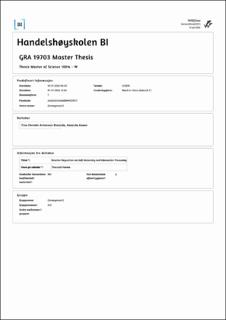Emotion Regulation via Self-distancing and Information Processing
Master thesis
Permanent lenke
https://hdl.handle.net/11250/3039078Utgivelsesdato
2022Metadata
Vis full innførselSamlinger
- Master of Science [1621]
Sammendrag
Emotions have been given much attention in the field of judgement and decision-making and are thought to be one of the factors affecting cognitive processing and decision-making. Lately, more research has focused on how these emotions can be regulated by the use of emotion regulation techniques. Among these techniques, self-distancing has been given much attention and has been proven to work positively on regulating emotions. Still, the amount of research investigating the relationship between specifically self-distancing and information processing is narrow. Even more so, the influence of self-distancing from anxiety on information processing has been given no or very little attention. This master thesis sought to cover this gap in the literature. This was done by the use of experimental between-subject design in a laboratory setting. The participants were divided into two conditions: immersed and self-distanced. Each group was asked to recall an event where they felt anxious from an immersed/self-distanced perspective. Next, they completed the Iowa Gambling Task (IGT) and a self-reported scale that measured the extent to which they relied on intuition vs analysis during the IGT. As predicted, self-distancing led to an increase in analytical thinking and abstract thinking, and a decrease in arousal compared to self-immersion. Overall, the findings indicate that self-distancing can be an effective tool for regulating state anxiety and that it has consequences on how people process information. The results, implications, limitations, and future directions are discussed.
Beskrivelse
Masteroppgave(MSc) in Master of Science in Leadership and Organizational Psychology - Handelshøyskolen BI, 2022
